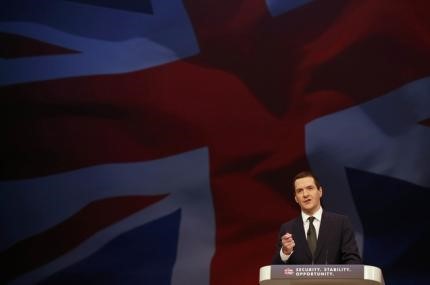MANCHESTER, England (Reuters) - British Chancellor George Osborne has stepped up his push to transfer more power to English town halls, saying he will allow them to keep all revenues from a tax on business and let the biggest cities raise more money for infrastructure spending.
Osborne, who has sought to reverse the centralisation of power in Westminster, said in a speech that the change would allow 26 billion pounds raised in business rates to stay in the hands of local councils each year by 2020.
He has already sought to give more powers to cities and towns, especially in northern England, which has failed to achieve the same job growth and higher incomes seen in London and the southeast over recent decades.
Such cities represent a power base for the opposition Labour Party, but Osborne -- who represents a constituency near the northern city of Manchester -- has built a closer relationship with them in recent years.
Currently, 50 percent of revenues from business rates are sent to the finance ministry which then sends money back in the form of grants, which vary depending on social deprivation and other factors.
"In my view, proud cities and counties should not be forced to come to national government with a begging bowl," Osborne told the annual conference of the Conservative Party, led by Prime Minister David Cameron, which won a decisive victory in a national election in May.
Osborne said the change represented "the biggest transfer of power to our local government in living memory".
The Conservatives under Margaret Thatcher stripped local authorities of their powers over business tax in 1990 due to mistrust of Labour-dominated authorities.
Under Osborne's plan, local authorities may cut business rates charged to companies in their areas, allowing them to try to attract new investment with lower rates.
A core grant from central government would be phased out and local governments would take on new responsibilities, he said.
A safety net policy, which protects local areas against big drops in business rates, would be maintained.
Big cities with elected mayors such as London and Manchester would be able raise rates to pay for infrastructure, as long as they had support from local businesses, Osborne said.

Business rates had previously been under review by the government. The structure of the tax is unpopular with many high-street retailers as it falls most heavily on firms that occupy more expensive town centre property and takes little or no account of their profits or turnover.